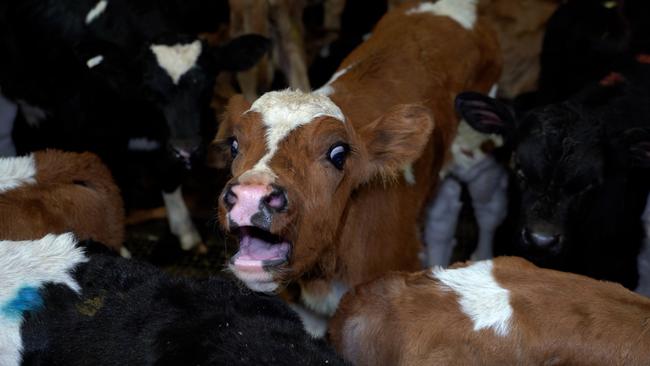Government accepts taskforce recommendations for abattoirs and will increase monitoring
The government has released the recommendations of a taskforce it set up in the wake of distressing footage of alleged animal cruelty at abattoirs. Read the latest.

Politics
Don't miss out on the headlines from Politics. Followed categories will be added to My News.
Tasmanian abattoirs will be subject to increased monitoring – including random spot checks – after the government accepted all but one of the recommendations from a taskforce set up to investigate alleged animal cruelty.
Two new animal welfare officers will be employed in Biosecurity Tasmania and will be able to visit abattoirs at any time to check video footage which has to be kept for 30 days.
The Tasmanian Livestock Processing Taskforce, established in the wake of distressing footage from five abattoirs released publicly last November, made 12 recommendations in its final report to the Tasmanian government.
It recommended that mandatory video monitoring, introduced after the November footage was released, be implemented under the Animal Welfare Act 1993 in two years.
Primary Industries and Water Minister, Jane Howlett, said the Department of Natural Resources and Environment Tasmania would progress the necessary regulatory changes within the timeframe proposed by the taskforce.
“In the interim, video surveillance remains mandatory under instruction from the Chief Veterinary Officer under the Animal Welfare Act 1993,” she said.
“The Tasmanian government accepts all the recommendations within the report, fully supporting 11 of these recommendations and one in principle.
“Adoption of these recommendations will improve the humane treatment of animals in our processing facilities and supply chain.”

The taskforce recommended an animal welfare advisor be employed to support, in particular, smaller processors to encourage and guide processors towards best practice animal handling.
The government supports that the recommendation in principle but said the appointment of an advisor “would provide a high risk of creating a conflict of interest of that role and Biosecurity Tasmanian’s compliance role”.
It argued that the appointment of an additional stakeholder engagement officer, and two new animal welfare officers along with $100,000 for projects to ensure continuous improvement of animal welfare would achieve the same outcome.
Ms Howlett said the government was committed to improving animal welfare in the State’s livestock processing facilities.
“Other recommendations relate to development of supporting information for industry, stakeholder communication and collaboration, and monitoring, which will also be implemented by NRE Tas,” she said.
The taskforce included the RSPCA and TasFarmers and Ms Howlett praised the taskforce and reference group for working “diligently and quickly on this important piece of work”.
Taskforce chair Felicity Richards, a beef farmer, also thanked those who had contributed to the Taskforce’s inquiries.
“Animal welfare is critically important in agriculture and it is the hope of the Taskforce that its work will support everyone involved in animal handling, from paddock to processing, in holding ourselves to the best standard of animal welfare we can achieve,” she said.
“I am deeply grateful to the taskforce members and representatives of the Tasmanian processing industry, whose expertise shaped these guidelines and the recommendations in the strategic implementation plan.”
The taskforce was set up after former Liberal, turned Independent member for Lyons, John Tucker received support in parliament for the government to audit animal welfare standards including unannounced monitoring audits and industry education.



